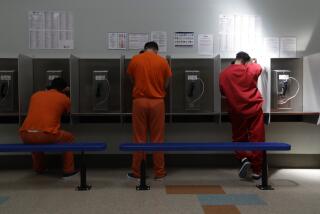Throwing Away the Key
The majority opinion by Chief Justice William H. Rehnquist that it is constitutional to hold dangerous criminals without bail turns logic and the Constitution on their heads. The chief justice and five of his colleagues reached this conclusion only by the most tortured twisting of the English language and in spite of the plain meaning of the Fifth and Eighth Amendments. There should be no mistake about it: The majority of the Supreme Court does not believe that accused persons are innocent until proven guilty.
To be sure, there are conflicting rights here, namely, society’s right to protect itself from murder and mayhem and an individual’s right not to be incarcerated without trial. When rights conflict, as Rehnquist noted in his opinion, judges must balance one against the other in deciding where justice lies. Reasonable people can disagree about how to strike the balance. In the case before the court (United States vs. Salerno, 86-87), six justices favored society’s right to protect itself, while three justices--Thurgood Marshall, William J. Brennan Jr. and John Paul Stevens--would have balanced on behalf of an individual’s right to due process of law.
We are more comfortable with the view of Brennan, Stevens and Marshall, who correctly called the majority’s opinion an “abhorrent limitation on the presumption of innocence.” The Constitution is designed to protect any such limitation and to make it impossible for the authorities to keep someone in jail merely by labeling him “dangerous.” Rehnquist and the majority neatly skirt the problem of punishment without trial by declaring that pretrial detention is “regulation” rather than incarceration.
And in the most tortured reasoning of all, Rehnquist opined that even though the Eighth Amendment forbids “excessive bail,” it “says nothing about whether bail shall be available at all.”
The purpose of bail is to make sure that an accused person will appear at trial while not keeping him in jail before he is convicted. It is a perversion of the system to use bail to keep people in jail without trial. If there is a case to be made against someone, let the government make it. If not, “preventive detention” should not be used as a substitute.
In the case of the Mafia leader Anthony Salerno, there is a strong social desire to keep him locked up, but the nation’s legal system should not go down that slippery slope of keeping people in jail because we don’t like them.
More to Read
Get the L.A. Times Politics newsletter
Deeply reported insights into legislation, politics and policy from Sacramento, Washington and beyond. In your inbox three times per week.
You may occasionally receive promotional content from the Los Angeles Times.






